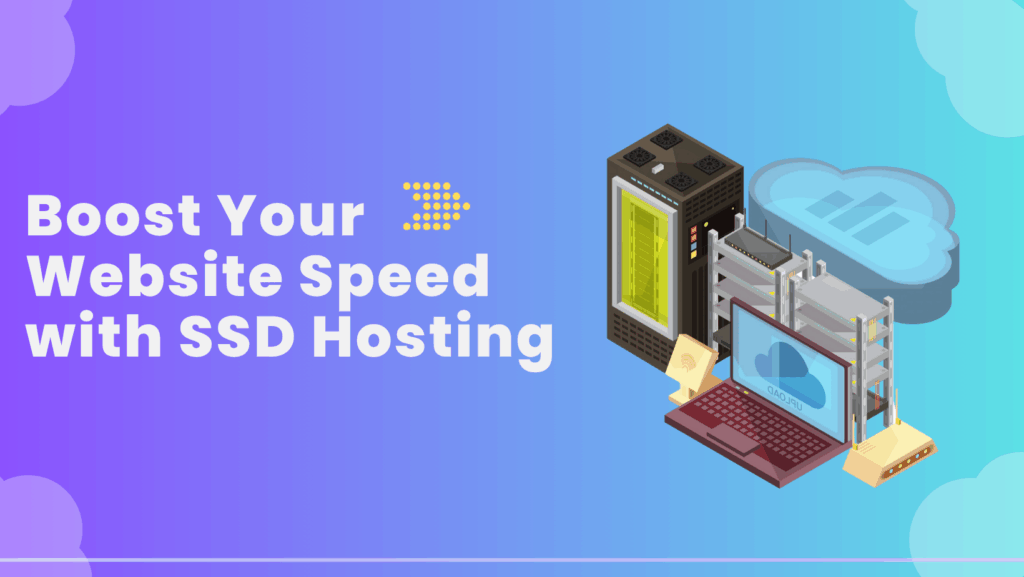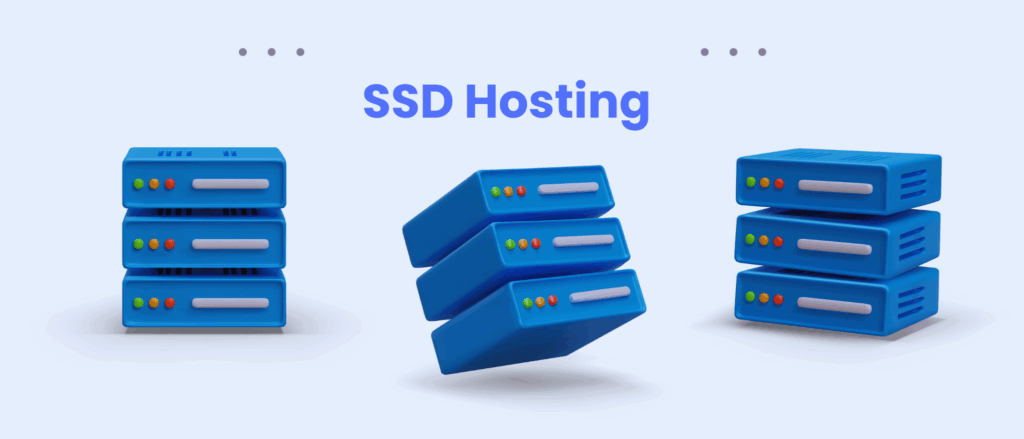Limited Offer. One-Time Deal.
Buy 3 years + Get 2 Free
Everything you need to launch online.

SSD Hosting isn’t just a tech upgrade, it’s a game-changer.
Let’s be honest, no one likes to wait. In a world of instant everything, even 10 extra seconds for your coffee feels like forever…especially when you’re tired, in a rush, or just craving that first sip. You’d probably complain, walk out, or swear never to come back.
Well, your website visitors feel the same way.
Running an e-commerce store, a portfolio site, or a full-stack web app? Site speed is your silent killer or secret weapon, and your hosting plays a massive role in it.
Why is site speed important?
A slow website = higher bounce rates, lower conversions, and worse SEO rankings.
So, how do you fix slow hosting?
You fix it at the source by upgrading your infrastructure with faster, more efficient server technology.
And that starts with switching to SSD hosting, which delivers faster data access, better uptime, and smoother performance overall.
And that starts with SSD hosting: faster data access, better uptime, and smoother performance overall.
And that’s exactly what brings us to the next question:

SSD hosting is a type of web hosting that uses Solid-State Drives (SSDs) instead of traditional Hard Disk Drives (HDDs). Unlike HDDs, which rely on spinning disks and mechanical parts, SSDs use interconnected flash memory chips to store and retrieve data, with no moving components involved.
This difference in structure results in dramatically faster data access, lower latency, and far greater reliability. Proper SSD hosting powers websites with lightning-fast performance, easily handling up to 20x more database requests than traditional drives. That means quicker load times, smoother user experiences, and better handling of high-traffic situations, all essential for performance-focused websites.

After we know the main difference between SSD and HDD, now we need to know how SSD affects your website speed
Website speed hinges on how fast your server reads and delivers files to users. Traditional HDDs, with their mechanical parts, create bottlenecks that slow everything down. In contrast, SSDs dramatically reduce latency and improve data retrieval times, delivering measurable speed benefits, such as:
For data-heavy or dynamic websites like eCommerce stores, the difference is even more critical. SSDs handle database requests quickly, support faster caching, and eliminate delays in delivering dynamic content.
And when paired with NVMe hosting, which leverages next-gen protocols to unlock even faster speeds, the performance boost becomes undeniable.
👉 To push your site performance even further, learn how optimizing server response time and integrating a CDN can work hand in hand with SSD hosting to achieve top speed. Read more here
Whether you’re running a business website, a personal project, or a dynamic web app, choosing SSD hosting brings a range of technical advantages:
SSDs offer significantly faster data access and read/write speeds compared to HDDs. That translates into faster website load times, even under heavy traffic or peak usage.
💡According to BrowserStack, 1 in 4 users abandon a website if it takes more than 4 seconds to load.
Site speed affects your search engine rankings. Google includes speed in its ranking algorithm, meaning a faster website = higher visibility.
SSD hosting helps improve your Core Web Vitals, keeps bounce rates low, and contributes directly to SEO performance.
➡️You can also read how website speed affects SEO ranking.
With no moving parts, SSDs are far less likely to fail, making them more durable and stable. This improves backup processes and reduces the risk of data loss due to hardware failure.
SSDs consume less power than HDDs, which makes them more energy-efficient, which is especially important for businesses that care about sustainability and reducing server costs.
SSD-powered servers handle simultaneous read/write operations with ease, perfect for CMS platforms, web apps, and eCommerce stores that constantly query databases.
If you’re still on HDD hosting, it may be silently holding your website back. And know the timing to upgrade to the SSD
If you’re not sure if it’s time to switch or upgrade your SSD hosting plan? Here are the clearest signs that your current setup may be holding your website back:
If your site takes more than a few seconds to load, especially during peak traffic hours, your hosting might be the bottleneck.
This doesn’t just frustrate users; it hurts your SEO and conversion rates too.
Unreliable uptime damages your brand reputation and costs you revenue. SSD hosting offers better reliability and hardware stability compared to traditional HDD setups.
Low scalability, capped RAM, or maxed-out CPU usage? Your server might not be able to keep up with your growing needs. With SSD hosting, you get better handling of I/O operations, especially for database-heavy or dynamic websites.
Insecure or outdated hosting environments often can’t keep up with modern security protocols. SSD servers tend to come with updated infrastructure, better protection, and faster patching cycles.
If your provider is slow to respond or lacks technical depth, that’s a sign to upgrade, especially if your site is business-critical.
More traffic, more products, more transactions? That’s great, but only if your hosting can handle it. SSD hosting scales better and faster, helping you grow without friction.
Need more domains, dedicated IPs, custom scripts, or support for media streaming? Your current plan might be too restrictive. Upgrading gives you more freedom to build and expand.
Over 80% of professionals rely on email for business communication. Some hosting plans limit email accounts and storage, while SSD plans often include better email handling and integration.
If your site crashes or slows down during high-demand events (like promotions or product launches), that’s a red flag.
Here’s a quick look at popular SSD hosting providers:

🚩If you need to know the top 10 providers for 2025 in detail, read this article: Top 10 Web Hosting Providers in 2025
In 2025, fast and reliable web hosting isn’t a luxury; it’s a necessity. SSD hosting delivers the speed, reliability, and scalability that modern businesses need to thrive. Whether you’re launching a new site or scaling an existing one, SSD (or NVMe) hosting gives you the edge.
Thamara offers SSD-powered hosting built on servers with blazing-fast speeds, robust security, and 24/7 expert support. If you’re ready to experience smarter hosting that empowers your growth, learn more about our SSD hosting.
Yes. The performance gains often justify the slightly higher price, especially for growing or complex sites.
Most providers allow you to switch plans or migrate your site to SSD-enabled servers.
Absolutely. WordPress performance improves significantly with SSD, especially for database-heavy sites.
eCommerce, SaaS platforms, blogs with high traffic, and custom apps all benefit from faster read/write speeds.

Buy 3 years + Get 2 Free
Everything you need to launch online.